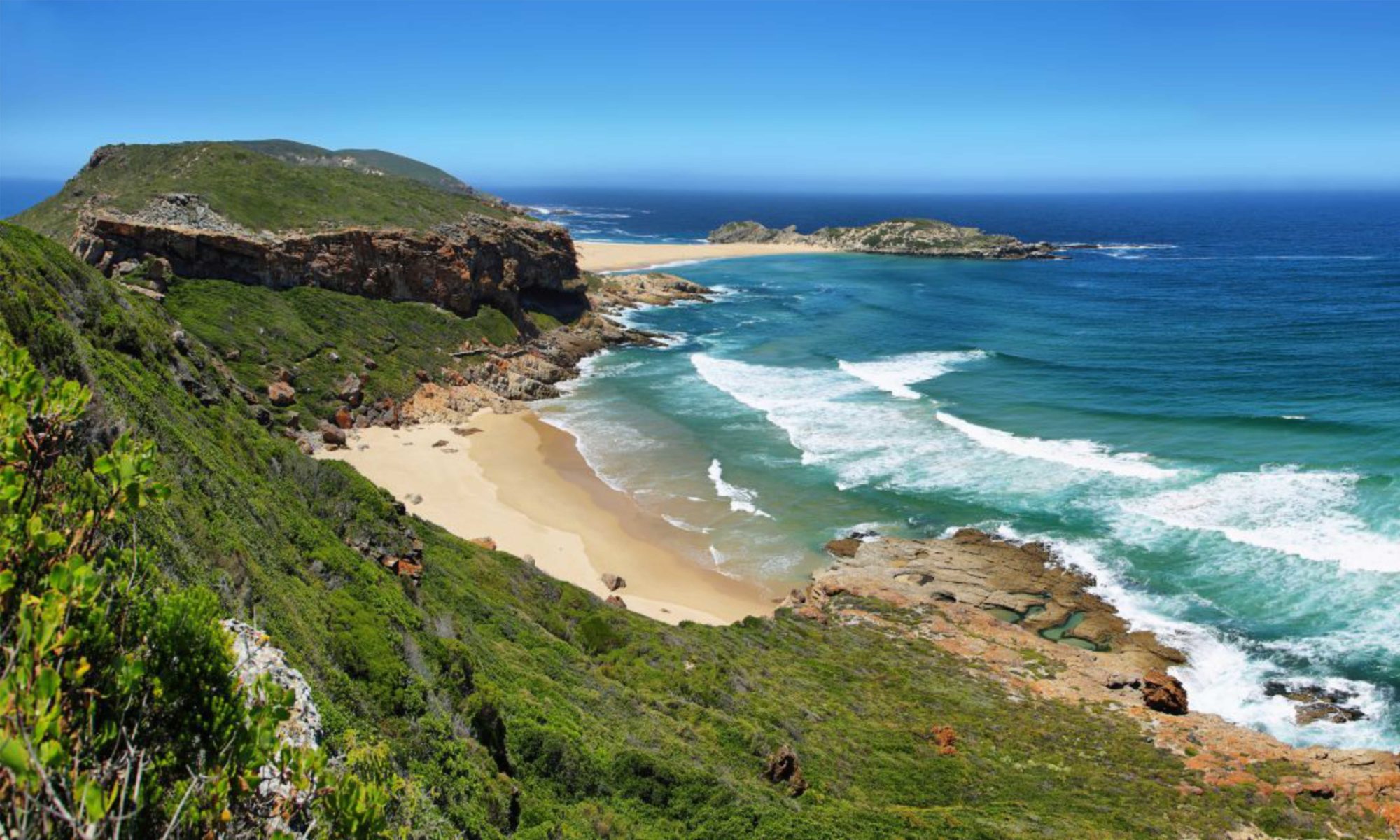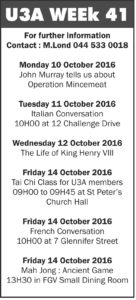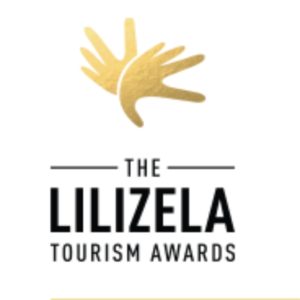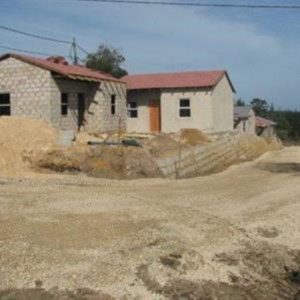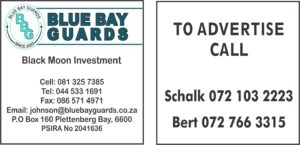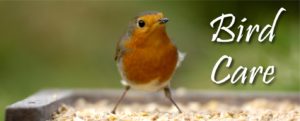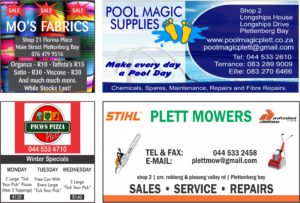PAWS 2016 AGM – SOME FACTS AND FIGURES
Di Butlin, Chairman of PAWS, Tracy van der Byl, Kennel Manager and Robert Ruiters, Inspector, presented their 2016 reports at the AGM held on 21 September.
We feel that it is important to share some key information with the broader Plett community, who continue to take an interest in our services.
Municipal Law Enforcement and PAWS work together on areas of mutual concern as PAWS performs a municipal function by housing animals brought in by them.
Animal cruelty : Children who were responsible for the dog that was found hanging from a tree were told to do so by an adult. We have spoken to them and their parents to make them aware that their actions were illegal. They can, however, not be used as witnesses against the adult.
Fireworks: Although illegal in Plett, we continue to deal with the aftermath of New Year’s Eve, with traumatised, lost and injured lost dogs and dead birds.
Disposal of dead animals: A municipal function that has reached a crisis point. Carcases are no longer buried at the dump site and vets and PAWS freezers are used to store them. To be transported to the George crematorium for mass cremation and the cost borne by the Municipality while other options are being considered.
Sterilisation programme: Vets reporting the general improvement in conditions of animals. While there is a definite reduction in the number of puppies and kittens, there are still too many and we hope to increase the number of community spay days.
Education programme: Proceeds from BATS play enabled us to put on performances of the Lunchbox play “Life of a dog” at 4 primary schools. We have had educational leaflets printed and will be completing an educational video for use in schools. Robert continues to visit and address schools about responsible pet ownership.
Dog fighting: This case has been dragging on for several years. We hope that those arrested will finally be convicted and sentenced.
Theft of dogs: Illegal sale of stolen dogs continues. Please make sure you buy from reputable registered breeder. Report suspicious sale of dogs “off the street”.
Container clinic: We have applied for overseas funding for our own part-time clinic, to enable us to treat more animals, more economically.
Kennel occupancy : While we accept that we may, when necessary, have to increase numbers of dogs per kennel, this is not always possible and wellbeing of dogs is paramount. We do not have the financial resources to expand number of kennels.
Feeding schemes: We would like to encourage people feeding dogs in industrial area and townships to work with us to ensure that owners bring dogs in for dipping, deworming and sterilisation before being given food. In this way, we can provide an incentive for owners to care for their dogs and discourage them from reliance on food from other sources. Pet ownership means taking responsibility.
Pet IDs : Tags and chips will allow us to find owners more quickly. Please stay with lost animals until PAWS arrives otherwise we spend fruitless hours looking for animals.
THANKS: To our Plett community, volunteers, businesses, vets and their staff, the PAWS shop, the Media and many other individuals and organisations, too many to mention, who support, donate, help in so many different ways.
2015/2016 PAWS stats:
6 915 dogs/cats treated (including dipping, deworming, wound care, tick and flea prevention, inoculation) in area of 150 sq km radius.
348 PAWS animals sterilised at cost of R208 900, including R100 000 spent on animals from other agencies.
108 animals lost and found.
105 animals admitted to kennels.
21 fostered.
121 animals rehomed (sterilised, dewormed, vaccinated).
183 animals euthanased at vet’s discretion (confiscated, terminally ill, injured, suffering, infectious diseases or requested by owners).
We pay tribute to Tracy van der Byl and Robert Ruiters for their outstanding commitment to their work which is performed under difficult conditions – for showing compassion to animals in distress, dealing with difficult situations in a positive manner, and managing stressful situations and customers. We appeal to the public to communicate with us about issues of concern before taking to social media, as we are committed to working closely with our community to alleviate suffering and neglect of animals in the Bitou area.
LILIZELA TOURISM AWARDS
Plett Tourism is proud to announce two tourism products, Africanyon Adventures and Plettenberg – a Forever Resort, have won the Western Cape round of the Lilizela Tourism Awards.
Africanyon
Africanyon Adventures is an adventure tourism business located in The Crags, Plettenberg Bay. Africanyon provides high-quality adventure activities borne from a true passion for the outdoors. Their flagship activity is canyoning (called Kloofing in South Africa and Gorge Walking elsewhere). Africanyon’s canyoning focus on creating an awareness and an appreciation for the environment, in a location that would otherwise remain hidden and inaccessible to most. Clients are guided through indigenous terrain packed with adventure and fun for the novice to the more experienced. Abseil in and around waterfalls, take a cliff jump and experience our unique rock-pool zip-line – a combination for the perfect outdoor adventure.
Africanyon
“The AfriCanyon Team are so deserved of this award,” says Director, Rogan Hindmarch. “Years of training, commitment and adherence to the core ethos of providing professionally guided excursions into the unknown wilderness have culminated in this prestigious South African award for Best Adventure in the Western Cape. Against stiff competition we could not be happier to receive the recognition of our cumulative efforts. Well done to each and every one of our Team Members for achieving and maintaining the high standards being acknowledged. You so deserve this.”
Forever Resort
Plettenberg – a Forever Resort, is primly positioned along the banks of the Keurbooms River in Plettenberg Bay. It is central to Plett’s wealth of eco adventures, animal experiences and leisure outdoor activities. Here you will find 3-star luxury forest self-catering log cabins with river views and brick chalets each with its own cozy fireplace. All booked accommodation has its own select satellite TV. For the more adventurous, relax in the picturesque, riverside caravan and camping park sites. All sites have power points and are positioned in a landscape dotted with Yellowwood and Stinkwood trees. And after a day filled with a string of exhilarating activities, tuck into a braai or “potjie” at sunset. Treat the family to a ferry cruise, frolic on the beaches, spot dolphins or southern right whales, explore the Otter or Robberg trails or simply treat the kids to a feast of fun at the resort.
ABOUT THE LILIZELA AWARDS:
These awards recognise and reward tourism players and businesses who work passionately and with pride to deliver a world class product and service and whose delivery grows South Africa’s global destination competitiveness. http://www.lilizela.co.za/
IMPORTANT INFORMATION:
Official hashtag: #plettitsafeeling
FB: https://www.facebook.com/PlettTourism
Twitter: https://twitter.com/Plett_Tourism
Instagram: https://www.instagram.com/pletttourism/
SCAM ALERT
It has come to the attention of Eden district municipality (Eden DM) that there are individuals posing as environmental health practitioners or health inspectors and demanding payment from owners of businesses for licence fees, health certificates and health reports.
This is an illegal practice and the general public and business owners are hereby warned not to participate in any activities by persons that pose as above-mentioned officials without relevant identification.
All environmental health practitioners employed by Eden DM will at all times be in possession of an official Eden identity document, which should be presented before any inspection commences.
This identity document is in colour with the Eden DM logo displayed in front, accompanied by a colour photo of the official and his or her South African identity number.
The reverse side will quote the applicable legislation (in red) enabling the official to perform his/her duties, accompanied by an HI number of the official registered at the Health Professionals’ Council of South Africa – as well as the date of issue and the signature of the municipal manager.
No Eden DM official will demand payment in cash, cheque or any other form of payment for services rendered.
Where health certificate fees or other fees are payable, an official document with a unique reference number with Eden DM banking details will be presented. Any fees due to Eden DM should by deposited directly into the banking account of Eden DM.
All inspections undertaken by environmental health practitioners are, with a few exceptions, captured electronically on a cellphone, and managers or persons in charge of the premises are required to sign on the screen of the phone, with an electronic pen. Inspection books are only used in rare cases where the electronic program does not make provisions for certain types of inspections.
Readers are urged to report any irregularities in this regard to the SAPS or any Eden DM office in their area of jurisdiction. For any assistance with the above matter, contact Johan Compion, manager of municipal health and environmental management:
Email: jcompion@edendm.co.za /
Phone: 044-803-1525.
PROJECT NOMINATION
The Knysna municipality’s department of human settlements has once again received a nomination for the Western Cape 2016 Govan Mbeki Human Settlements Award. – after receiving three accolades from the Govan Mbeki Housing Awards in 2014.
The provincial department of human settlements will host this year’s Govan Mbeki Awards ceremony, scheduled for Friday, September 23 at the Century City Convention Centre in Cape Town. The occasion is aimed at celebrating innovation in the delivery of human settlements in the Western Cape and in South Africa.
The Knsyna municipality was nominated for the Dam-se-Bos South project in the Best Informal Settlement Upgrading Project and Best Enhanced People’s Housing Process Project categories.
The value of the Dam-se-Bos project is over R7-million and it was funded by the provincial human settlements department. The development consists of 130 serviced sites with platforms, retaining walls and fencing.
As part of the judging procedure, delegates from provincial offices went on a site visit to the Dam-se-Bos South project on September 1.
Knysna mayoral committee member for planning and integrated human settlements Velile Waxa was pleased about the nomination and said, “We are delighted and honoured to be nominated once again for this prestigious award for the years the focus of housing delivery in our town has shifted from simply providing houses to raising dignity, building integrated communities and creating opportunities for local entrepreneurs.”
The awards were named after the late Govan Mbeki in 2006, based on the role he played and the vision he had for preserving human dignity and provision of human settlements for all South Africans.
BUYING A BIRD
Birds can be wonderful pets. They can bring years of enjoyment into a home. However, owning a bird takes no less responsibility than owning a dog or a cat. Make sure you take the time to do your homework and research the species you want before you get one. Start by making a list of reasons you want a bird and a list of traits that are important to you. Compare species of birds to narrow down your list to a few that make the grade. Several questions to take into consideration include the following:
Why do you want a bird? As a pet for the children? As a companion to you or to another bird?
How old are the children in the family? If your preteen or teenager wants a bird, who gets the bird when they go off to college?
Where will the bird stay? Indoors? Living room? Outdoors in an aviary?
Do you want to teach your bird to talk? How much noise is acceptable to you, the family, and the neighbors? Some species are naturally quieter; others can scream and screech.
How much time are you willing to commit to the bird on a daily basis? Half an hour a day is needed just for daily feeding and cleaning. What about playtime and socialization? These are essential.
How long do you want the bird? Finches live about four years; Budgies, nine years; Cockatoos, forty years; an Amazon or African Grey, up to fifty or more years. Make sure you plan for the bird’s entire life. This means including for the bird’s future care in your will.
How much are you willing to spend for up-front costs such as purchase price and the cage and accessories? Prices range from several dollars for a small Finch or Budgerigar to several thousand dollars for a Hyacinth Macaw.
How much are you willing to spend on food, veterinary care, and toys?
Who will watch the bird while you are on vacation with the family? Some birds do well at boarding facilities while others are much better at home and require someone to come in and care for them.
Where will you buy the bird? Breeder? Pet shop? Individual that no longer wants or can keep a bird?
How many birds do you want? Some birds do well alone with enough human attention. Others are much happier with others of their own kind to socialize and live with.
Health is a big consideration in getting a bird. They can carry diseases that can infect other birds in the house and possibly humans also. Learn what a healthy bird should look like and how she should act. Take your new bird to an avian veterinarian within a day or so of purchase for a check up.
If you have a preference for male or female, remember it may be difficult to tell the difference in some species. If breeding the bird is in the plans for the future, DNA testing or surgical sexing is available at some veterinary clinics.
These questions should just be the start of the consideration process. Birds are intelligent, amazing animals that deserve a long, healthy, happy life. If you determine one will fit in with your lifestyle, enjoy your new feathered friend.
Will your bird be a good traveler?
When it comes to travel, the disposition of every bird is different. Many small birds such as canaries, finches, and budgies are high-strung and can easily become stressed. They are best left home. Others, like the gregarious Amazons, love to travel. Still others, such as cockatoos and macaws, may suffer separation anxiety, and thus will not abide being left home alone. For many birds, travel is interesting, keeping their active minds entertained. Best of all, travel lets them be with their favorite person all day.
Traveling with your bird is not difficult and can be fun, if he wants to come along. Need help with determining whether your bird is an eager companion? Try answering these questions:
Is your bird accustomed to a routine? (And will you be able to maintain it?) If your bird is very young, his feeding, play, rest, and hygiene patterns may not be well established. Travel is best for those mature birds who can adapt to a change in routine.
How long will your bird stay comfortably in his cage? You learn to read your bird’s many moods at home. On the road, you need to pay extra attention to them to prevent stress. Before taking a long trip, we recommend that you familiarize your bird with the travel carrier. Then start with short trips, and gradually increase their duration.
Does your bird get motion sickness? Like humans, your bird can experience motion sickness. His brain can receive conflicting messages – from his eyes and the rest of his body – about whether he is in motion. Again, starting with short trips will help you determine if motion sickness is a problem for your bird.
Is your bird healthy? Travel causes stress for owners and their pets. Schedules change. Diet changes. Water consumption is often disrupted. Travel is more difficult for some birds than others. For example, some experience phobias, while others tire easily. Before any extended trip, it is a good idea to take your bird to your veterinarian for a health check-up. The stress of travel could cause serious problems in a bird that is already ill.
Is it legal to transport your bird on this route? Believe it or not, depending on the species of your bird, it may not be. Some states exclude certain species. It is your responsibility to check in advance before you travel. For any bird, interstate travel usually requires a health certificate signed by your veterinarian within ten days prior to your departure.
The site,www.aphis.usda.gov/import_export/animals/animal_import/animal_imports_states.shtml, has links to the latest regulations on interstate movement of animals, written and maintained by individual states. International travel is much more complex. Always ask your veterinarian for advice.
Will the trip and the destination be safe? For safety concerns, it is best if your bird travels in a specifically designed travel cage. Your bird should not be left in the car unattended, so it may be necessary to make special arrangements depending upon your travel plans. There are also places you should not take your bird, for example, exceptionally cold or hot climates. Also check your route and destination to make sure there are no disease outbreaks or established quarantines that could affect your bird.
Will you have time for your bird at your destination? If your answer is “no,” home care is a better option. You will need to have time to play with your bird, feed him, clean his cage, etc. If this will not work into your travel plans, consider a pet-sitter.
HOUSE FEATURES
Do you ever wonder what buyers think when they come to view your property? Ask anyone who has spent a week spring cleaning their home before putting it on show and you’ll quickly figure out that everyone wants to put their best foot forward when it comes to selling up.
The Rawson Property group published a press release recently which revealed some really interesting information. This included noting what happened when prospective buyers were asked to wear eye-tracking goggles.
The goggles recorded not only where the buyers were looking, but also how long they spent examining certain things, and the results showed which specific areas received the most attention.
Location, location, location
It turns out that buyers are more concerned with the property’s location than with its assets. Some 95 percent of those who viewed homes while wearing the goggles spent notable amounts of time looking out of the windows into the garden and the neighbourhood beyond. Armed with this knowledge, it makes perfect sense to clean the windows and tidy up the garden, but what else do buyers look for?
Obviously different things appeal to different age groups and in an effort to keep things simple we’ll focus on the ‘millennial’ (those born between 1980 and 2000) buyer.
Time is of the essence
Buyers in this age group don’t generally have time for a ‘fix me upper’ and are therefore more likely to buy a property that is in tip-top condition. They will pay particular attention to the state of the fixtures as most won’t have the extra cash needed to overhaul expensive areas such as kitchens and bathrooms once they’ve moved in.
Working from home
Don’t be surprised if a buyer in this segment asks about office space. A growing number of young professionals now work from home and preference will undoubtedly be given to homes that have additional rooms that can be transformed into practical workspace.
On the working from home front, millennial buyers are really, really interested in technology and will almost certainly show far more interest in a home that has good internet access than in one that doesn’t. The same goes for cell phone coverage. While sellers may have little control over the type of lines service providers have made available in their area, if these are high-speed or fibre optic, this can become a major selling point which should be mentioned to prospective buyers.
Maintenance costs
Modern buyers also look at homes that are low maintenance. Tiled or wooden floors are far easier to maintain than carpets, and granite work surfaces are going to look good for years. Another thing that young buyers are acutely aware of are energy costs. The price of electricity has soared in recent years and most of these buyers are going to be drawn to homes with more ‘green’ fixtures such as a solar geyser.
Safe and sound
Security is always going to be paramount in any buying decision and while not every home will have advanced security features, if your home is going to appeal to buyers, it should at least be well lit, have burglar bars, and have security gates fitted to all exterior doors.
